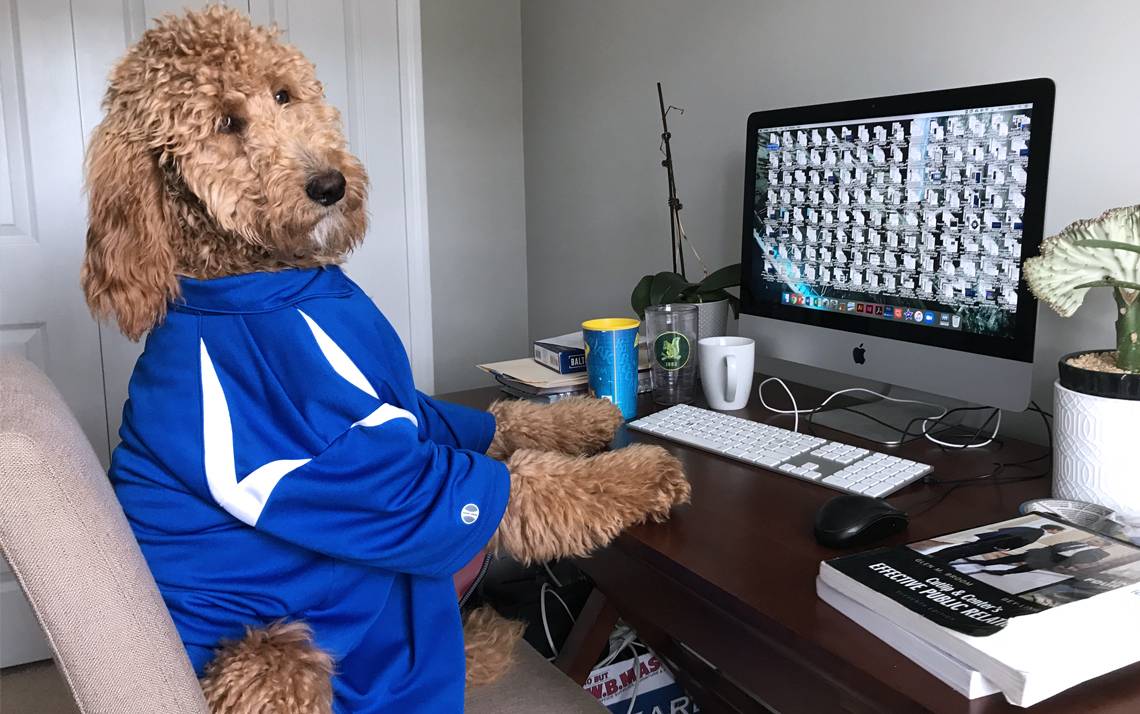Arf! Meet My Work From Home Office Mate
Some Duke employees find comfort from pets while working remotely during COVID-19 outbreak

A furry face popped into Evan Heisman’s recent teleconference meeting on Zoom with teammates in the Dean of Students Office.
The caramel-colored fur belonged to Raleigh, Heisman’s eight-month-old Goldendoodle. Raleigh is a frequent guest on the Dean of Students Office’s weekly meetings since Heisman began started working from home on March 16 to help stop the spread of COVID-19.
“She’s the office mascot,” said Heisman, a staff assistant with the Dean of Students Office. “I think my coworkers are a little disappointed when she goes off-screen.”
Raleigh is usually nestled at Heisman’s feet napping or chewing on a reindeer toy but occasionally jumps into the video conference view during virtual meetings. She’s been a source of stress relief for Heisman and his wife Morgan, assistant coach for Duke Women’s Lacrosse. They walk and step away from the computer so she can run outside.
“Having her has been helpful for our mental health,” Heisman said. “She’s always making us smile.”
Pets have a powerfully positive effect on our mental health, according to the Human Animal Bond Research Institute. The institute, which researchers the connection between humans and their pets, found that animal-human interactions reduce anxiety, depression and loneliness and enhance general well-being.
“People are incredibly present when they’re with a pet,” said Maggie Bunzey, lab manager for the Duke Canine Cognition Center. “You get the calming benefits of putting soft fur, and you’re more likely to get outdoors and exercise because your pet can’t be cooped inside all day.”
Try not to swoon too much when you see how these pets keep your colleagues company during these trying times.
Whitney Edwards
Project Planner, Duke Human Vaccine Institute

Chirping has become the defunct sound in Whitney Edwards’ home since adopting eight chicks the week of March 13.
Edwards and her fiancé Charles cared for five chickens and a dog when they decided to adopt the chicks in preparation for working from home.
“We love having chickens and have meant to get more,” Edwards said. “Social isolating seems like the perfect situation to raise eight chicks. They are a welcome distraction.”
The chicks are currently living in Edwards’ dining room in a homemade coop with a heat lamp that keeps their environment around 90 degrees Fahrenheit. Occasionally, Edwards lifts a chick out of the coop to join her on a video conference call.
Edwards named the chickens after figures from pop culture such as Arya from “Game of Thrones,” rocker Joan Jett and Thelma and Louise from the movie of the same name.
“They all have such distinct personalities,” Edwards said. “Some want to be held, others run away from us and some could care less.”
Gregory Herschlag
Assistant Research Professor of Mathematics

Oliver was a package deal when Gregory Herschlag went on a first date with his now-wife Vanessa Barnett-Loro eight years ago.
Oliver was Vanessa’s dog. He joined the couple on a walk around southern Durham before the two went to dinner at Thai Café. He’s been attached to Herschlag’s hip ever since.
“My wife likes to joke that Oliver loves me more,” Herschlag said. “He’s always snuggling up next to me and hates it when he sees me giving attention to someone else. He’ll try to get between Vanessa and me when we hug.”
Oliver has been Herschlag’s work companion since he began social distancing two weeks ago. The dog cuddles up next to Herschlag while he works from a meditation cushion on the floor.
“He’s been my shadow,” Herschlag said. “It’s been great to spend some extra time with him. It’s hard to be too upset when you have him staring lovingly at you.”
David McDade
Senior Grants and Contracts Administrator, Duke Economics Department

With his round-trip commute shortened from a two-hour drive to a one-minute walk in his home, David McDade is enjoying the additional time he can spend with his pets.
And McDade needs the additional hours since he has three dogs, three cats and four fish.
The newest addition to the family is a tabby cat, Thomas. McDade and his wife rescued the kitten on the side of the road near their home in Louisburg about a month ago. The other pets adjusted nicely to the new family member.
“There are no fights,” McDade said. “Everyone gets along beautifully.”
The only issue was finding a space in the house where the six dogs and cats won’t interrupt McDade's work by requesting belly rubs. He discovered as long as he steers clear of the couch, he can work in peace.
“We’re all facing a tough time right now with what’s going on in the world, but my pets are in absolute heaven,” McDade said. “Their life is fantastic because my wife and I are always home.”
Other Loveable Pets
Jon Bae, associate chief medical officer for Patient Safety & Clinical Quality and mental and emotional well-being co-convener for Healthy Duke, works next to his beautiful cat Sassy.
Meet Sassy, @JonBae01 ‘s feline friend #FridayFluff pic.twitter.com/CuTlBmXNJ0
— Duke Center for Healthcare Safety and Quality (@DukeHSQ) March 20, 2020
Staff with the David M. Rubenstein Rare Book and Manuscript Library are adjusting to the unblinking stares and snores from their friends.
Rubenstein staff are all working from home and getting used to not seeing one another, but here are a few of our new co-workers who are uninterested in socially distancing themselves. pic.twitter.com/SkAUo22tuG
— Rubenstein Library (@rubensteinlib) March 20, 2020
Add photos of your pet office mates on our Facebook story:
We ask for your continued help to share the proactive and extensive work being done by all Duke community members during the COVID-19 outbreak. Please share ideas, shout-outs and photographs with us here or write us at working@duke.edu.